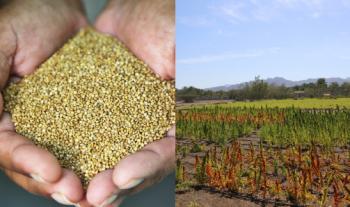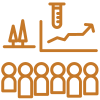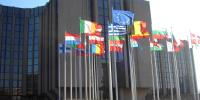
The global population is expected to increase to 9.7 billion in 2050 and there are concerns about the capacity of agriculture to produce enough food for the growing population. By some estimates, food production will need to go up by about 60 per cent either through increase in crop yields per unit area or expansion in the arable land by 2050 to meet the demand (World Population Prospects-the 2008 Revision, UN, 2009). Furthermore, several regions already suffering from malnutrition, water scarcity and soil degradation have been forecast to have a large population growth which raises serious concerns about whether traditional agricultural methods and crops species will have the capacity to sustain global food production targets.
Major cereal crops like wheat, rice, barley and corn are progressively failing to withstand increasing salinity and scarce water resources in marginal environments that are most vulnerable to climate change. Therefore, there is an urgent need to identify alternative solutions to sustaining, and, possibly, increasing agricultural productivity in areas where growing traditional crops has become difficult and sometimes uneconomical.
Hence, quinoa can play an important role in eradicating hunger, malnutrition and poverty; furthermore, quinoa has an important nutritional value – the seeds are rich in essential amino acids and vitamins. Due to its adaptability to harsh environments including poor saline soils with annual rainfall as little as 200 mm, quinoa could play a major role as an alternative staple crop in marginal environments.
Recognizing quinoa’s potential for marginal environments, ICBA has been leading a global quinoa program since 2007 in collaboration with national, regional and international research, government and donor organizations in the NENA region as well as Central Asia. Despite the growing global recognition of quinoa’s potential, and positive research outcomes in pilot studies, there are still many constraints and issues to be addressed before quinoa becomes a crop of choice in marginal areas where other major crops have so far been dominant but are now failing due to climate change and degradation in the quality of soil and water resources.
Recognizing the need to better understand and resolve these challenges and to fully exploit the potential of quinoa, ICBA and FAO are organizing the International Conference: Quinoa for Future Food and Nutrition Security in Marginal Environments on December 6-8, 2016.
This conference will provide a unique platform for discussions on ecological, economic and social aspects related to introducing quinoa for sustainable agricultural production in marginal environments.
The conference will be held at Zayed University, Dubai, UAE. To learn more about the conference themes, speakers, registration and the call for abstracts, please see the attached announcement or visit www.quinoaconference.com
























